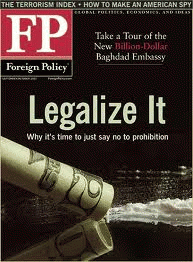Noam Chomsky was one of the first to raise the question of US failed statehood in Failed States: the Abuse of Power and the Assault on Democracy. Failed States was published in early 2006, before it became anyone realized the federal government was incapable of rehabilitating post-Katrina New Orleans. This was also prior to the 2008 economic collapse, which the US government also badly mismanaged, in contrast to other developed countries which have managed unemployment and home foreclosures far more efficiently than either the Bush or Obama administration. And prior to Obama's mismanagement of the BP oil spill, the worst environmental disaster in history.
What's a Failed State and Who Decides?
It used to be up to the CIA and World Bank to declare when countries were failed states. Over the last five years Foreign Policy magazine, in conjunction with Fund for Peace, has taken over this responsibility. In 2008 Foreign Policy was bought by the Washington Post. The Fund for Peace is a non-profit organization devoted to "sustainable security."
Foreign Policy/Fund for Peace rate potential failed states on twelve criteria: demographics (low life expectancy), refugees, illegitimate government, brain drain, public service, inequality, group grievances, human rights, economic decline, security, factionalized elites (vying for control with legitimate government) and external (military and economic) intervention. Here's their 2010 failed states index: http://www.fundforpeace.org/web/index.php?option=com_content&task=view&id=452&Itemid=900.
Somalia is at number one, followed by Chad, Sudan, Zimbabwe, Republic of Congo, Afghanistan and Iraq. Pakistan is number 10, Haiti number 11.
The Concept of a Partially or Semi-Failed State
I myself would put both Pakistan and India much higher on the list. As D. Suba Chandran of the Institute of Peace and Conflict Studies points out (see http://www.ipcs.org/pdf_file/issue/IB150-Suba-FailingRegions1.pdf), both countries have large geographic areas that are essentially ungovernable. In India these include Jammu and Kashmir in Northeast India and the so-called Red Corridor (plagued by high levels of militant communist activity) in Central/East India. Likewise the tribal areas in Pakistan refuse to recognize the Pakistani government in Islamabad. In particular Balochistan has a strong Baloach separatist movement, which considers the current Pakistani occupation illegal.
Does the US Qualify as a Failed or Semi-Failed State?
The two main analysts to link the US government's management of the 2008 economic collapse and its long term viability as a political entity are Paul Roberts, Assistant Secretary of the Treasury in the Reagan administration, and Dr Sam Vaknin, an Israeli-born economic and health policy analyst in Eastern Europe, have major concerns about the virtual paralysis of both the Bush and Obama administrations in effectively managing the severe recession following the economic collapse.
To support his argument that the US is already a failed state (see http://www.counterpunch.org/roberts10222009.html), Roberts cites the irresponsible squandering of billions of dollars a year on the de facto US occupation of Iraq and an unwinnable war in Afghanistan; massive foreign borrowing and debt creation; virtual collapse of US industrial production; and total failure of federal regulatory agencies to regulate. He points out the inability of Congress to address any of these issues, owing to the "ultra-constipated" movement of federal legislation through the Senate and House - a process that regularly brings US governance to a standstill when appropriation bills become stalled. During these recurring periods of Congressional stalemate, the federal bureaucracy continues by inertia while waiting for new appropriations to be approved.
A Perspective from Eastern Europe
Vaknin, who describes the US as a Semi-Failed State (see http://samvak.tripod.com/failedstate.html), has a somewhat different perspective. According to Vaknin, a Semi-Failed State manifests the following five characteristics:
1. It maintains all the appearances of power, legitimacy and control but is actually a "political and societal zombie state," both in its domination by corruption and cronyism, and in its failure to perform the domestic governing functions expected of a national government. It only continues in power due to the absence of other alternatives.
2. Its citizenry is characteristically disgruntled, hostile and suspicious
3. It's generally regarded by other countries with derision, fear and abhorrence.
(Note: You can view every article as one long page if you sign up as an Advocate Member, or higher).






